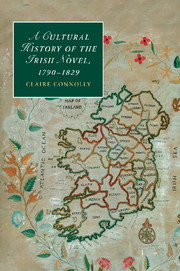Chapter 1 - Fact and fiction
Published online by Cambridge University Press: 05 December 2011
Summary
The nineteenth century was a chilly and scanty one where Irish literature is concerned. I myself delight in Miss Edgeworth’s novels, and could keen after Lady Clonbrony’s yellow satin chair-covers, pushed out for the sake of ‘painted velvet.’ But as regards the life of Ireland and the people of Ireland, they are patronising, artificial, taking a bird’s-eye view of a simple peasantry, grateful for small mercies, and an impulsive, prodigal landlord, who, repentant, leaves the husks of London, and wins Heaven in eating his own mutton at home.
Lady Gregory, ‘The Irish Theatre and its People’, Our Irish Theatre: a Chapter of Autobiography [1913] (Colin Smythe: Gerrards Cross, 1972), p. 140The Ireland we live in is only a proximate version of the entity to which we refer in literary, historical or political discourse. The idea of Ireland permits us to observe and comment upon the fact of Ireland. The reverse is also true. As a result, there are no isolated facts; they all subserve the dominant idea.
Seamus Deane, ‘Arnold, Burke and the Celts’, Celtic Revivals: Essays in Modern Irish Literature (London: Faber, 1985), p. 19For Lady Gregory, reviewing the cultural achievements of nineteenth-century Ireland, the figure of Maria Edgeworth loomed large. Co-founder of the Abbey theatre and at this stage of her career already an accomplished cultural broker and veteran of the Playboy riots, Gregory reads Edgeworth through the negative lens of the cultural revival of the late nineteenth and early twentieth centuries. She finds pleasure in the finely realised domestic detail of Edgeworth’s novels but pushes this aside in favour of a stern appraisal of fictions which are damned by their distance from ‘the life of Ireland and the people of Ireland’. In her comments, Gregory moves rapidly into a series of judgements – ‘patronising, artificial, taking a bird’s-eye view’ – which underpin her censure of Edgeworth’s approach. Such criticism of the Irish romantic novel reverberates throughout the next hundred years and this book represents a concerted effort to dislodge it.
The dichotomy between ‘the life of Ireland and the people of Ireland’ and the ‘chilly’ world of ‘Miss Edgeworth’s novels’ remains a powerful one, however. In an interview given in the United States, Gregory repeats the kinds of accusations found in her autobiographical writing: ‘It was an artificial literature we had out of that nineteenth century. Look at the novels that were brought out of Ireland – Miss Edgeworth, Lever, Lover and the rest. Some of them I admire very much – Miss Edgeworth’s, for example, but in the main they gave us only a bird’s eye view.’ Elsewhere, Gregory writes of Edgeworth’s fiction with some fondness: she shared her own ‘delight’ in the stories with her grandchildren (‘the chicks’) at Coole Park. Over such memories of the books as cultural objects lovingly passed between the generations, Gregory imposes a more strictly ideological appraisal of the general tendency of Irish fiction.
- Type
- Chapter
- Information
- A Cultural History of the Irish Novel, 1790–1829 , pp. 20 - 46Publisher: Cambridge University PressPrint publication year: 2011



